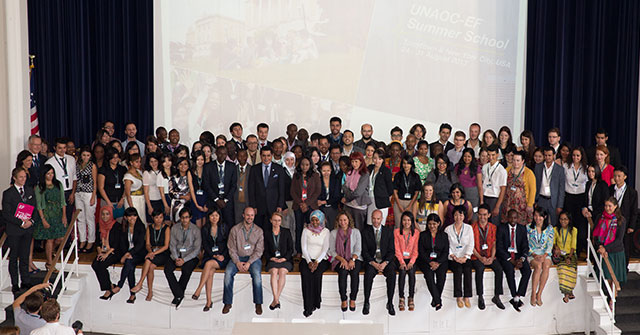
In 2010, the UNAOC delivered its first annual Summer School as part of promoting the Alliance’s mission—improving cross-cultural understanding and cooperation among countries, peoples and communities. Since then, 3 Portuguese universities hosted UNAOC Summer Schools: Aveiro in 2010, Lisbon in 2011, and Coimbra in 2012. From 2010 to 2012, the UNAOC Summer Schools have welcomed more than 350 young adults from over 69 countries during one week of living and learning together. In 2012, the UNAOC organized an additional regional Summer School in Malta — focusing on issues in the Euro-Med region. This regional Summer School brought together a smaller number of youth to engage in focused discussions on conflict resolution, dispute management and peace-building in the context of their region.
In 2013, the UNAOC and EF Education First partnered for the first UNAOC-EF Summer School which welcomed 100 global youth leaders from 92 countries to the EF Tarrytown Campus in New York state, USA, at the end of August. These 100 youth were selected from more than 20,000 applicants from 192 countries elected based on their motivation to improve intercultural understanding and cooperation across borders.
The Summer Schools are based on the conviction that youth are the driving force for change. Also, a central principle behind the Summer Schools is that people share more in common than is often recognized. When given the opportunity, they will explore their common interests and collaborate across borders to address the major issues of today’s interdependent world.
The design of the Summer Schools rests on a process of mutual learning, using the participants’ experiences as the starting point of the training-learning process. Participative learning is key to the success of the Summer Schools. Our training approach includes a mix of lectures, workshops, role play, site visits and social activities. The pedagogical team includes several members with dynamic professional backgrounds coming from various horizons and parts of the world: representatives from civil society, the UN, faith groups, universities, think tanks and, of course, youth organizations.
Using the skills they acquire at the Summer School, youth return home empowered by their experience and strengthened in their capacity to implement cooperative action in their home communities and beyond.
